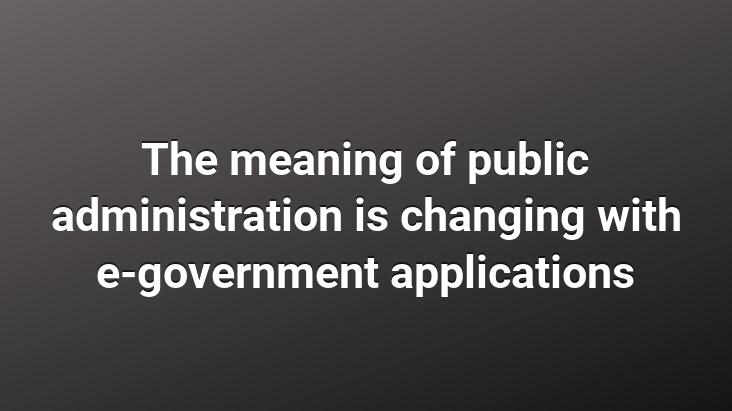
In the report titled “e-Government: Involving citizens in government with pervasive technology”, published by Deloitte on the transformations that technology has created in the public sector at the global level, the sharing of information between citizens and the state was examined.. The report emphasizes that the renewal process of classical state institutions that share information with citizens only one way is accelerating.. According to the report, citizens who receive services can now reach the state more easily and convey their opinions and criticisms.. Thus, while public institutions work more effectively, waste of resources is also reduced..
Deloitte published its report titled “e-Government: Engaging citizens in government with pervasive technology”. The report included examples of e-government applications from around the world and examined how technology transformed public services.
According to the report, institutions in the public sector, which now function as a kind of “folder cabinet” by hiding information with classical methods, cannot work effectively and efficiently, cannot provide services to citizens and waste public resources.. In the report, which offers solutions from case studies in 2007, Deloitte partners, whose opinions are quoted, state that the key word for the efficient operation of the public sector is “governance”.. Technologies that enable citizens to participate in the process are now changing the nature of the citizen-state relationship..
The “virtual path” between public institutions and citizens
In a remarkable review included in the report, the Massachusetts Health and Humanitarian Services Administration (EOHHS – Executive Office of Health and Human Services) Services) to replace these “folder lockers” in the government service, is cited as an example.. In this example, all the services of HHS (Health and Human Services) have been brought into an integrated, modern flow. Information of citizens who apply to the HHS “Virtual Way”, a web application produced to access these services, is sent to all relevant institutions.. In this way, all health institutions, non-governmental organizations, shelters for the homeless, independent living centers that may be related to the situation of the citizen can determine which services can be provided and which programs the citizen is entitled to.. Thanks to this virtual path, which all institutions can access with their passwords, unnecessary stationery, too many applications and loss of time and effort are prevented..
Public-private sector hand in hand in India
Another example highlights the role that the private sector can play in public governance. In the pilot project called “Saksham”, Microsoft and the Canadian International Development Center reached approximately 4,000 users with Internet kiosks they placed in Indian villages.. A mix of government services and private sector business activities such as banking and insurance made it possible to maintain kiosks.
Solution to traffic congestion in London
Again, an application made in London shows how positive results can be achieved with good governance despite all the difficulties: The pay traffic zones solution developed against congestion was developed by gathering all relevant stakeholders (33 London boroughs, emergency services, business and art circles, disability groups) and sharing their suggestions.. The pay system, which started in February 2003, has now been expanded to the south of the city with even more stakeholders.
Informal economy is hindered by tax legislation that spreads to the public in Mexico
Although there are 45 million employees in Mexico, until recently, the government only employs 12 million people. could collect taxes, and more than half of the workers earned their living outside the formal economy.. When it turned out that this was due to the dispersion of each citizen’s credentials across different government departments and the complexity of tax laws, Mexico’s federal tax agency, the Servicio de Administration Tributaria (SAT), embarked on the largest reform project in Latin American history.. A technology infrastructure has been established where hundreds of civil servants working in different departments will share information.. Started a web service project for simple understanding and payment of taxes while ultimately giving each taxpayer a personal number.
Turkey is in the top ten in e-government
Making a statement about the report, Deloitte Turkey Public Sector Leader Bülent Beydüz said, “The information age and its technologies are changing the dimensions of public services.” and continued his words as follows:
“A very advanced point has been reached in e-government applications in Turkey.. Recently, Brown University in the USA researched the Internet services of public institutions in 198 countries.. In the study, it was revealed that Turkey entered the top ten in these services and surpassed developed countries such as Germany and Switzerland.. The web-accessed services of Tax, Identity, Passport services are commendable practices in the e-government and public sector.”
Deloitte advises on “governance” projects that solve public problems
Bülent Beydüz, citing the Deloitte report, which includes global examples, stated that new approaches can be brought to many public services that are waiting for a solution in Turkey as well.. Beydüz said:
“Developments that will play an active role in the prevention of the informal economy in our country, citizen-oriented solutions in the health sector, are important problems that still stand in the way of e-government applications.. Deloitte creates governance solutions in public services with its global experience and knowledge.. Deloitte, which has undersigned many successful e-government applications in the world, offers this expertise to public institutions in Turkey and will be proud to present it in the future.”